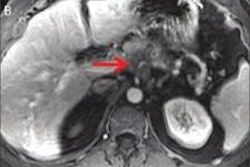
The American Society for Radiation Oncology (ASTRO) has released a new clinical practice guideline on the use of radiation therapy to treat patients diagnosed with pancreatic cancer.
The recommendations were detailed in the September-October issue of Practical Radiation Oncology (Palta et al, Vol. 9:5, pp. 322-332). The guideline takes a patient-centered approach that integrates patients' values and preferences into treatment decisions and provides recommendations for when radiation therapy is appropriate, according to a statement from ASTRO. It also provides guidance on optimal dosing, timing, and fractionation, as well as how to prevent and handle common side effects of pancreatic radiation therapy.
The ASTRO guideline covers four main areas:
- The use of radiation in presurgical, postsurgical, definitive, and palliative treatment settings
- Stereotactic versus conventional radiation therapy
- Technical aspects of radiation therapy
- Mitigating common side effects
The guideline also provides recommendations on indications for radiation therapy, including the following:
- Conventionally fractionated radiation therapy is conditionally recommended in the adjuvant/postoperative setting for patients with high-risk features such as positive lymph nodes and margins following surgical resection. Stereotactic body radiation therapy (SBRT) is recommended only when the patient is enrolled in a clinical trial/data registry.
- Conventionally fractionated radiation therapy or SBRT is conditionally recommended after chemotherapy in the neoadjuvant/preoperative setting for patients with resectable disease.
- Systemic chemotherapy followed by chemoradiation or SBRT is conditionally recommended as an option for definitive treatment in patients with locally advanced disease who are not candidates for surgery.
A 14-member task force developed the guideline after a systematic literature review of 179 articles published from May 2007 through January 2017.



















